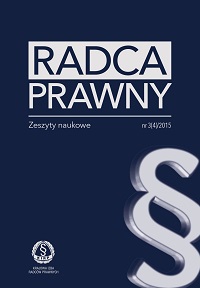Glosa do uchwały składu siedmiu sędziów Sądu Najwyższe-go z dnia 30 stycznia 2015 r., sygn. III CZP 34/14 (niedopuszczalność prokury łącznej niewłaściwej)
Gloss on the resolution of seven judges of the Supreme Court of 30 January 2015, court file No. III CZP 34/14 (the inadmissibility of improper joint procuration)
Author(s): Adam KarczmarekSubject(s): Civil Law
Published by: Krajowa Izba Radców Prawnych
Keywords: Proxy; joint proxy; improper joint proxy; branch commercial proxy; company; National Court Register; Supreme Court; business activity register
Summary/Abstract: This gloss pertains to a resolution of seven justices of the Supreme Court, in which the Court, acting upon motion of the First President of the Court, considered apparent discrepancies in the practice of registry courts regarding the construction of regulations on proxies. Said inconsistencies concern the admissibility of entering a single proxy into the register of entrepreneurs of the National Court Register, with the reservation that such a proxy may only act jointly with a member of the Management Board. This type of proxy is known in the doctrine and judicial decisions as improper joint proxy. In the prior judicial decisions of 1938 and 2001, the Supreme Court had ruled in favor of admitting such proxy grants, while concurrently emphasizing the utility of this solution for the participants in business transactions. However, in the resolution discussed, the Supreme Court departed from the previously-held position, finding that an improper joint proxy appointment is not possible from a de lege lata perspective. The Civil Code does not provide for granting an improper joint proxy. Furthermore, in view of the statutory prohibition of limitations on proxy effective against third parties, a proxy holder’s freedom to act may not be made conditional upon the proxy’s cooperation with a Management Board member. In addition, the Supreme Court pointed out that the very act of granting a proxy is a unilateral legal transaction. In the Polish legal system, legal transactions are governed by a numerus clausus principle, which means that they may be effected only if the law so provides. Since the law does not expressly provide for granting a proxy to a single individual with the reservation that he or she may only act jointly with a member of the Management Board, then the granting of such a proxy would constitute an infringement of the numerus clausus principle of unilateral legal transactions. This gloss is favorable to the Supreme Court’s ruling. The author presents the arguments employed in earlier judgments and juxtaposes them against the Court’s current stance. Despite his support for the Supreme Court’s legal argumentation, the author disagrees with the opinion included in the statement of reasons for the resolution, which finds that improper joint proxy is not a useful tool for business entities. Recognizing its practical use and putting forth an assumption that improper joint proxy would not generate any risks for the participants in business transactions, the author, de lege ferenda, supports its introduction into the legal system as a fourth type of a proxy.
Journal: Radca Prawny. Zeszyty Naukowe
- Issue Year: 2015
- Issue No: 3
- Page Range: 207-222
- Page Count: 16
- Language: Polish

